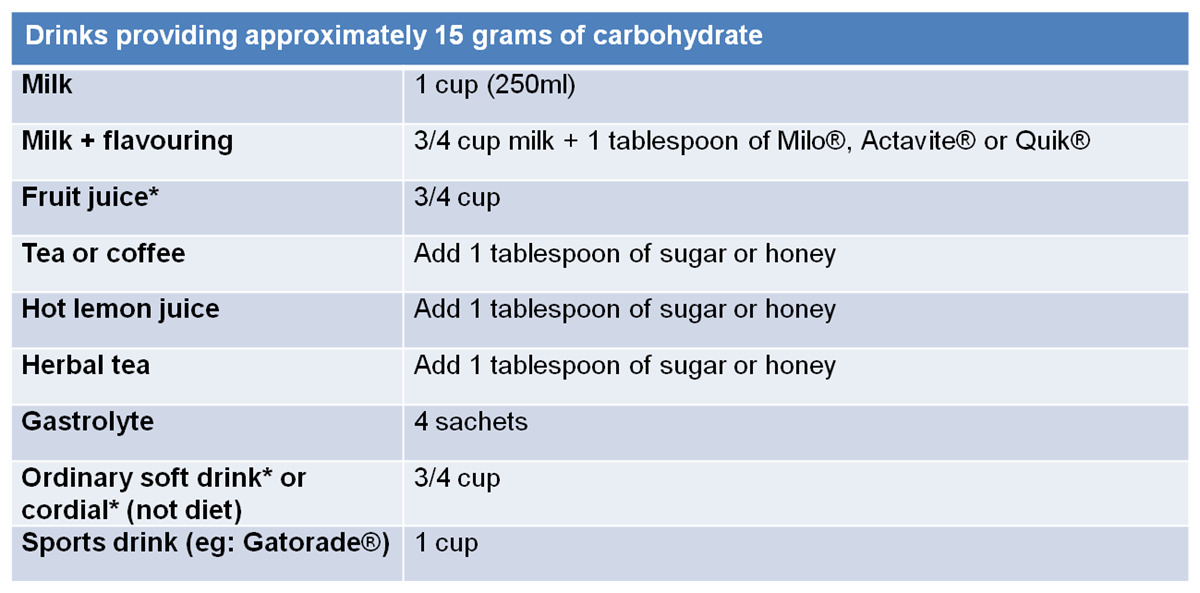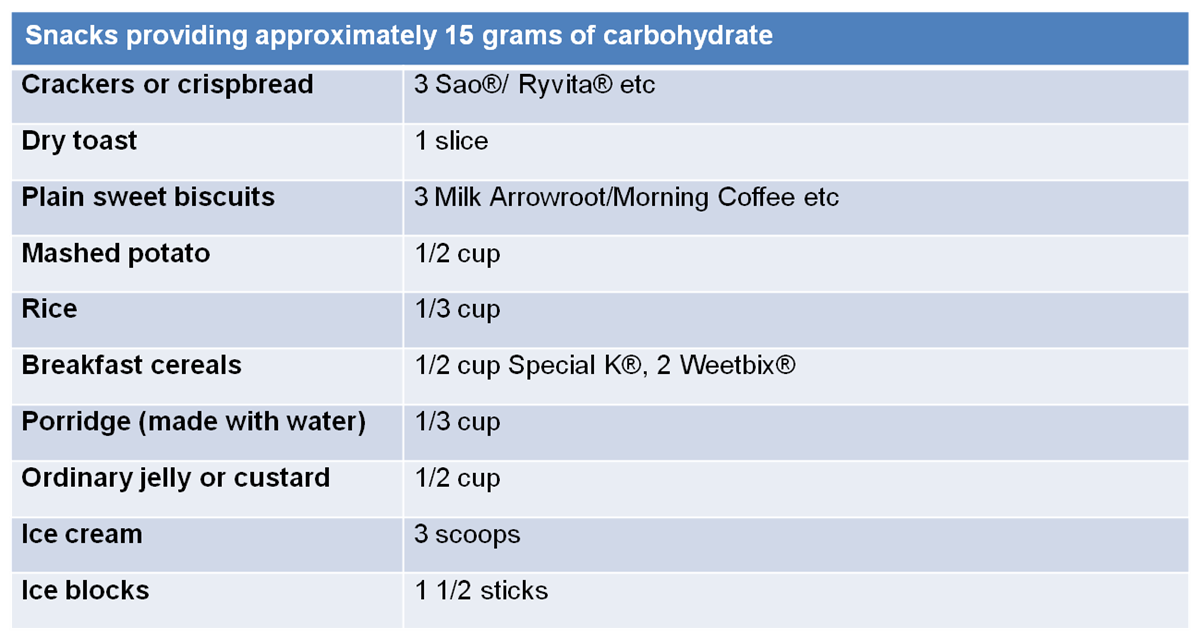Diabetes and Sick Days
Introduction
When you are sick your body releases stress hormones to help you fight the illness, infection or stress. Stress hormones can cause your liver to put more glucose (sugar) into your bloodstream. Stress hormones can also make it harder for your insulin to do its job properly. This can cause your BGLs to rise, whether you have type 1 or type 2 diabetes. Therefore, at the earliest sign of any form of illness such as a cold or virus, it is important for you to take action.
If you take insulin, when unwell, do not stop taking your insulin! Test your blood glucose levels often, check for ketones, keep drinking and, if possible, eating – and rest. Be aware that there may be times when you will need to contact your doctor or diabetes educator.
What do I do when unwell?
There are five important steps for you to take:
- Always take your insulin. When unwell, you must continue to take your insulin. If advised to reduce or stop your insulin, seek a second opinion from your diabetes specialist, diabetes educator or your hospital emergency department. Only in rare cases is the insulin dose reduced during illness, in fact you often need more insulin, not less.
- Test your blood glucose levels – every 2 hours at first. If your blood glucose level is more than 270 mg / 15 mmol often and you have ketones, you need extra insulin.
- Test for ketones – Test for ketones regularly, using either ketone urine test strips (available from your pharmacy or through the National Diabetes Services Scheme) or a meter which allows blood ketones to be checked (such as Optium® or similar).
- Rest – If possible have a friend or relative either stay with you or check on you frequently.
- Keep drinking and (if possible) eating – Eat or drink carbohydrate-containing foods/fluids if your blood glucose levels are under 270 mg / 15 mmol. Eat non-carbohydrate containing foods if 270 mg / 15 mmol or above.
Refer to Guidelines for Carbohydrate/Fluid Replacements below.
When do I need to call my doctor?
There are certain times during illness when your diabetes health professional will need to increase your insulin dose. Contact your doctor or diabetes educator if:
- Urine ketones are moderate/heavy and blood glucose over 270 mg / 15 mmol.
- Blood ketones are more than 0.6 mmol/L and blood glucose over 270 mg / 15 mmol
When to contact your doctor IMMEDIATELY!
- If you can’t keep food or fluids down and have persistent vomiting, diarrhoea and/or abdominal pain.
- If you have deep rapid breathing or breathlessness.
- If you are extremely drowsy.
- If you have a ‘fruity’ odour to your breath. (See What is ketoacidosis? below).
What are ketones?
When there’s not enough insulin in the body, glucose can’t enter cells to provide energy. The body then begins to break down fat as a source of energy.
This process causes ketones to be produced. Ketones also need insulin to enter the cells and when there is not enough insulin, they build up in the blood and are eventually passed through the kidneys and into the urine.
While large quantities of ketones can be serious, small amounts of ketones are not harmful and can also be found in people who do not have diabetes.
What is ketoacidosis?
Ketoacidosis is a life-threatening condition that can occur when you are ill or have a very high blood glucose level resulting from a lack of insulin. The presence of large amounts of ketones in the blood or urine indicates ketoacidosis.
Signs of ketoacidosis can include:
- Nausea, vomiting and/or abdominal pain.
- Deep rapid breathing or breathlessness.
- Extreme drowsiness.
- A ‘fruity’ odour to the breath.
Guidelines for carbohydrate/fluid replacements
It is very important to keep up your carbohydrate and fluids when you are ill.
If you can eat normally
- If you are able to eat normally, do so and sip extra fluids each hour, about 1/2 –3/4 cup, a little less for children. To prevent dehydration, drink unsweetened fluids such as water, diet soft drinks/cordial, weak tea/coffee, vegetable juice or broth.
If you can’t eat normally
- Have some easy to manage carbohydrate drinks, snacks or small meals. If you are unable to eat, drink carbohydrate-containing fluids if your blood glucose levels are under 270 mg / 15 mmol. See the list below for ideas. To prevent dehydration, drink unsweetened fluids such as water, diet soft drinks/cordial, weak tea/coffee, vegetable juice or broth, about 1/2–1 cup each hour.
- Remember, if you can’t keep food or fluids down and have persistent vomiting or diarrhoea, get medical advice immediately.
Keep up your carbohydrates and fluids
- It is very important to keep up your carbohydrates and fluids, even when you are ill. Here are some ideas to provide 15 grams of carbohydrate per hour if your blood glucose levels are under 270 mg / 15 mmol.


*Care should be taken with sweetened or hypertonic fluids if diarrhoea occurs. Sweetened fluids may need to be diluted up to 1:5 for optimal absorption.
Related:
- Diabetes and Tele-Health
- Diabetes and Symlin
- Diabetes and Glimepiride
- Diabetes and Gastroparesis
- Diabetes and Lipohypertrophy
- Diabetes and High Impact Exercise
- Diabetes and Menstruation
- Diabetes and Adrenalin
- Diabetes and Sick Days
- Diabetes and Stress
- Diabetes and Alcohol
- Books and Audio Resources
- Nerve Damage – How does diabetes affect the nerves?
- Diabetic Thyroids
- Diabetic Kidneys
- Diabetic Blood Pressure
- Diabetic Eye Exams
- Preventing Night Hypos – Overnight BGL Testing
- Delay Eating
- Glucagon Rescue
- Total Daily Dose (TDD)
- Continuous Glucose Monitoring System (CGMSs) List
- Insulin Pump Holidays – Diabetes
- Insulin Pumps List
- Blood Glucose Meters List
- Insulin Pump Accuracy
- Dead In Bed
- Points Report
- Blood Glucose Log Book
- A1C/HbA1C – what is it?
- Ketones
- Jelly Beans
- Starchy Carbs
- Meal Sizes
- Low-GI foods
- High-GI foods
- Managing Diabetes at School
- Diabetes Back to School Checklist
- Basal Insulin
- Bolus Insulin
- Hyperglycaemia – High Blood Sugar
- Long Term Complications of Diabetes
- Glucose Tablets for Diabetes
- Hypoglycaemia – Low Blood Sugar
- Diabetes and Exercise
- Exercise
- Diabetes and Pain


